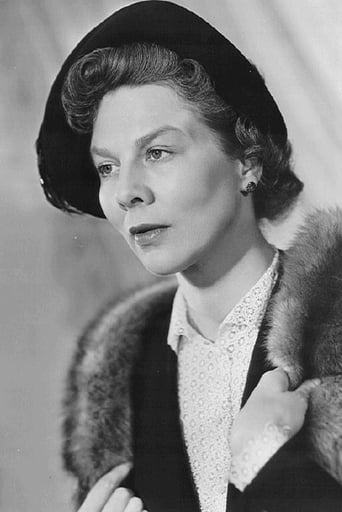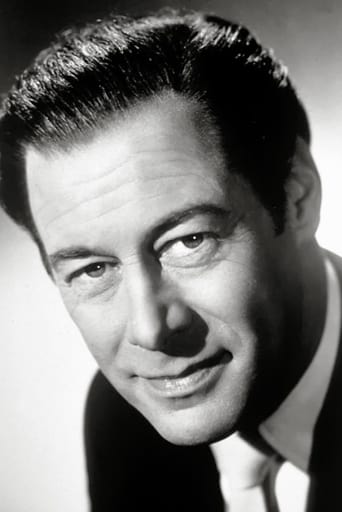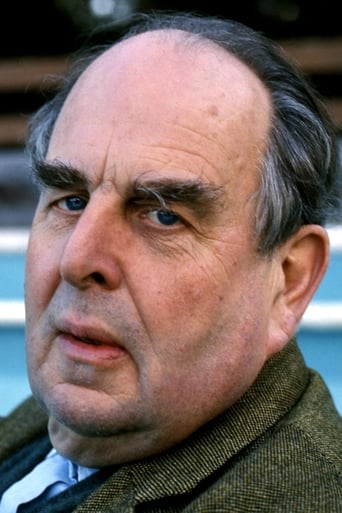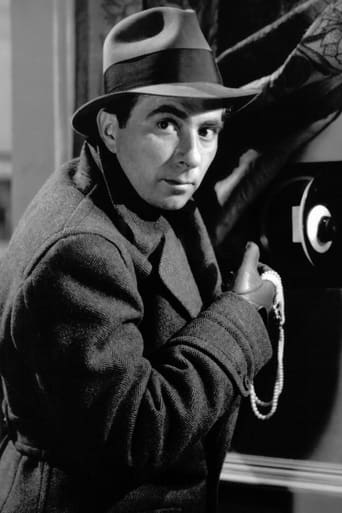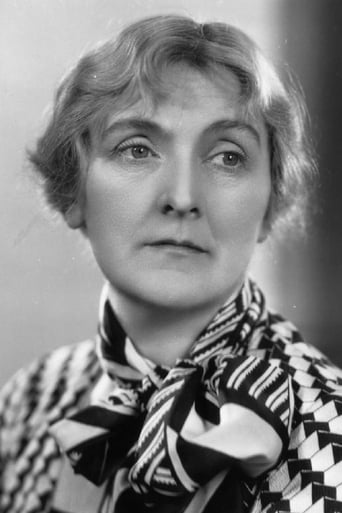WasAnnon
Slow pace in the most part of the movie.
Vashirdfel
Simply A Masterpiece
Odelecol
Pretty good movie overall. First half was nothing special but it got better as it went along.
Rosie Searle
It's the kind of movie you'll want to see a second time with someone who hasn't seen it yet, to remember what it was like to watch it for the first time.
SimonJack
George Bernard Shaw's three-act play, "Major Barbara," premiered on the stage in 1905 London. It wasn't made into a movie until this film came out in 1941. Shaw was involved with the film and wrote some additional material for it. The story has three main elements. One is the Salvation Army and caring for the poor on the streets of London. Another is related – advocates follow God and serve him in their service to those poor. And the third is industry that provides jobs so that people don't wind up poor and on the streets. In this case, it's specifically the munitions industry. This is a wonderful movie with witty dialog. It is well written, directed, filmed and acted by the entire cast. And what a cast! Rex Harrison is Adolphus Cusins, Robert Morley is Andrew Undershaft, Robert Newton is Bill Walker, Sybil Thorndike is The General, Marie Lohr is Lady Britomart, Deborah Kerr is Jenny Hill and Wendy Hiller is Major Barbara. Hiller gives a performance worthy of an Oscar. But, she didn't even get a nomination; nor did the film receive any awards recognition. The film came out in the summer of 1941. England was at war. It had survived and won the Battle of Britain in the skies over England the year before. It had been pushed off the continent at Dunkirk on June 4, 1940. And, it was engaged in a massive land war against Germany in North Africa. Many women and children had died in the London bombings, and in the German conquest of Europe. Thousands of soldiers and sailors already had lost their lives. America was not yet in the war, but the Western world was feeling the ravages of war.Now comes a movie – a comedy, no less – based on a Bernard Shaw play with a strange message. It says that munitions manufacturing is better for society than the charitable works of the Salvation Army and similar groups. The reasoning is that the factory work feeds, clothes and shelters people so they don't wind up on the street. But the charitable work just provides soup and a cot for a night's sleep, and the people remain downtrodden the next day. I don't deny that Shaw had good intentions in pointing out the value of business providing jobs versus charities feeding people out of work. But, it's also plain that Shaw is poking fun at the Christian charitable groups. His satire is as plain as day. One must remember that Shaw was a professed atheist. Most atheists, like agnostics, Christians or followers of any other belief, are content just to hold their views and let the other fellow have his. But, professed atheists are different. It is their "duty" or need to put down any beliefs contrary to their own. Similarly, zealous Christians know their calling is to spread the good news. The Salvation Army was born in London in 1865. William Booth founded it as the East London Christian Mission. Then, in 1878, he reorganized the mission as the Salvation Army. He gave it a military structure and became the first General. When Shaw wrote his play in the early 20th century, the Salvation Army had spread around the world. So, Shaw pokes fun at the Salvation Army (and other Christian charitable groups). Those who deny any satire fail to see or understand Shaw's glaring exaggeration. When Andrew leads Barbara, Adolphus and others on the tour of his huge munitions complex, he takes them to a workers' housing community. Isn't it marvelous? Nice new homes and whole neighborhoods laid out with parks and playgrounds for the children. I'd like to know where such model communities exist in any industrial country. Surely they're not in England or America. Nor were there any Communist countries in the world that provided such model accommodations for their workers. So, just where was this great beneficence of the munitions industry in Great Britain? There have been company housing plots in coal mining areas and others, but they are more indentured than ideal communities.Yet, the ending message of this play is that the Undershaft munitions industry was more beneficial to the public and individual people than the Salvation Army. But that message flew in the face of the reality of the times. The exaggerated satire was lost on the public at a time when churches and charitable groups were rising to help care for the homeless, orphaned, hungry and lost millions that were being created by war. And that war, incidentally, was made possible by the endless supply of munitions from the Undershafts of the world. As it turned out, Shaw's social satire was doomed by the reality of events of the time. Shortly after he wrote his play, the world plunged into World War I. Right when the play was made into this superb movie, the world was beginning to feel the ravages of World War II. So, Shaw won his point in his play, but he lost it on the stage of real life. All that aside, today we should look at this film and see the comedy, the satire and the contradictions. And enjoy some stupendous performances. We should enjoy seeing Rex Harrison beating the bass drum for the Army band. Or see the demure Deborah Kerr in her movie debut. Wendy Hiller's role was refreshingly convincing and uplifting. Even when she had a change of conscience toward the end. Which, by the way, was not so convincing to audiences — again, because of the war taking place. Hiller gave a superb performance. She finally did receive an Oscar – in 1959. She won best supporting actress for her role in "Separate Tables" of 1958.
aramis-112-804880
Once I asked my Sunday School class (Disciples of Christ) about an article I read about mob money given to some churches. Some of my class said however the money was earned (if "earned" is the term for mob money) it could be used for good. Then I asked what would they think if the KKK gave the same amount, and wanted it known. More demurred, though some made the argument that money itself is neither good nor evil, and it was still a good irony to take money earned from evil and turn it to good works and helping people. By rejecting it one might be taking food from the mouths of those who are in need (ours is a sharing church, not a builder of Crystal Cathedrals).Being the teacher and therefore moderator I took no part in the discussion; and it's just as well because I don't know what to think. Both sides made very good, but not altogether, persuasive arguments and I still have no opinion on the matter.This is more or less the theme of Shaw's play, written in 1905 and filmed in 1941, at the height of the Blitz, with an excellent cast. Wendy Hiller is good as the woman who loves saving souls in the Salvation Army, but who has a crisis of faith when her father, a wealthy industrialist, offers the Salvation Army fifty thousand pounds and, over her objections, accepts it.But when Barbara resigns her commission in the Salvation Army, is it pride, or her own problems with her father? Or is money really "tainted" just because it's earned from selling munitions? After all, munitions don't kill people, people kill people. (and, personally, as a capitalist I believe in earned money)The fact that he is a munitions maker is immaterial. Shaw was a Socialist and despised capital, despite the fact that the twentieth century that stretched 95 years after the play was written proved capitalism knows how to create jobs and lift the living standards of the poor but Socialism only knows how to lower all standards to equal squalor.The rest of the cast is uniformly excellent. Young professional Shavian Rex Harrison is good, and has a moment of brilliance when he's trying to pass through a trombone section of the Army. Robert Morley is a bit disappointing (I'm afraid I was expecting the arrogant Robert Morley, but he's just as good playing a pleasant-natured old munitions maker--in his thirties). The other major Robert in the cast, Newton, is his usual self, wonderfully hammy. Other familiar faces to American audiences will be Miles Malleson and Deborah Kerr, looking lovely in a very early role.Also in the credits are rising David Lean, as "assistant to the director." Curiously, Ronald Neame replaced Freddie Young as cameraman, since young would go on to have amazing success working with David Lean on his later epics.Like all Shaw's plays, it's talky. Not talky in the overly clever way of Wilde. More philosophically-talky,and eventually pedantry. And, as usual, Shaw stacks the deck in his own favor.Just as does criticism of this movie as "pro-war" or "anti-war." No one is "pro-war," but more open-minded people realize its necessity (as did American Presidents Wilson, FDR, JFK, LBJ, WJC, and BO, all of whom waged it at one time or another).Shaw is never very relevant to an American audience, since Americans never came from a caste-ridden society. And Shaw is a lot of talk, talk, talk. But if you can avoid Shaw's wicked sleight of hand, there are some good momens here, though lots of it is dull. And Shaw seems to have forgotten the Christian adage, "Money is the root of all evil," but is not evil in itself, nor are any THINGS, but from the hearts of men.
Neil Doyle
If you can sit through the first half of MAJOR BARBARA there is some small reward in that the second half brightens up a bit and there is less of the tedious social commentary that infects the first half--with an outrageously hammy performance from ROBERT NEWTON. He's actually a turn-off for me in the first half of the film.WENDY HILLER is full of confidence in the title role and is charming throughout. REX HARRISON has an unusual character to play and he does so with his usual skill intact. ("I feel that I and nobody else would marry her"). But the real star of the film is ROBERT MORLEY, a leaner looking Morley with a becoming beard, who has some wonderful scenes with members of his family--particularly his son for whom he has no love at all.But overall, this is a stodgy, stage-bound looking production burdened by much too much of Shaw's lengthy rants, the social commentary overtaking the storyline and making the whole thing a pompous affair that had me waiting for "The End" to flash on the screen.I don't second the praise the film has received from intellectuals who love this sort of thing. Despite good performances from the leads, it's got a boring first half that is likely to turn off many would be viewers. Of course, there are some witty Shaw lines. ("You'd sell your soul to the Devil for a pint of beer!").And incidentally, DEBORAH KERR is totally wasted in a bit role that is very colorless and not at all memorable.
theowinthrop
I happen to like this film. It is almost as good as "Pygmalion", the previous Shaw - Pascal collaboration, but that film had Leslie Howard in it as Higgins, and as co-director. Here, although Wendy Hiller is back, Howard is not involved and Rex Harrison is the romantic lead (and the philosophic lead is Robert Morley, as the man of wealth Andrew (or, as Shaw says, "St. Andrew") Undershaft). It has a grand cast supporting these three, including Mary Lohr, Deborah Kerr, Emlyn Wiliams, and Robert Newton (for once showing what a terrific actor he was when not drunk). The best parts are when Newton tries to be stoical and get knocked down to show he can take what he gives out to weaker types. He does get under the skin of Torin Thatcher (as a reformed boxing champ, named Todger Fairchild), only to have Thatcher humiliate him by forcing him to pray.Shaw the comic dramatist is always a treat. Shaw the self-created man with all the answers is another problem. "Major Barbara" is a look at how money is made by ways that are spiritually appalling (armaments and booze for example), but which guarantee jobs and hope to people who can't get them from the world of religion. One probably can agree with this point of view, but the constant pushing of Undershaft's point of view - nobody ever trounces him in an argument - is annoying. He seems omnipotent in this play (as Shaw, no doubt, wanted him to be). I once suggested that it would have been delightful if after one of his speeches he had actually had coughed blood (to show he was mortal). But Shaw never would have done that to St. Andrew.Yet he did do something within a decade after writing "Major Barbara" that was inconsistent. Shaw probably never willingly discussed it with anyone. Undershaft rules his armaments firm with a total control. He dictates to the government on policies he needs. The stockholders don't seem to exist. But in 1916 Shaw's optimism about dictatorial capitalists had faded. World War I shattered him a bit, and he wrote "Heartbreak House". In it is the character of "Boss Mangam", a powerful business tycoon like Undershaft, who proves to have feet of clay. It seems the great tycoon has to satisfy those stockholders or his empire is taken from him. The same, of course, has to be true of "St. Andrew" Undershaft as well. He probably is his largest shareholder, but he never says he is sole shareholder. Undershaft was quite content and pontifical in 1907 when he describes his religion of cannons and prosperity for all who listen to him. But that was peacetime. Somehow, in 1916, "St. Andrew" would probably have found it harder to be as glib about his doctrines as he had been.
